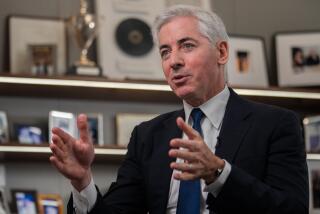Fighting to Save Pimco’s Reputation
Fighting for the reputation of a business he built up for 30 years, bond market guru Bill Gross said Tuesday that his Newport Beach-based company shouldn’t have been implicated in the mutual fund trading scandal -- and that he would seek to “divorce” its name from affiliates that are facing potentially more serious allegations.
In his first wide-ranging interview since Pacific Investment Management Co. was charged with fraud last week by the New Jersey attorney general, Gross defended the $375-billion bond fund operation that he oversees. He insisted that his firm, known as Pimco, didn’t harm shareholders despite allowing a hedge fund to engage in active trading of certain bond funds in recent years.
At the same time, the 59-year-old Gross made clear that he believed Pimco’s well-known name had been hurt as smaller stock mutual funds owned by the same parent company, the German insurance titan Allianz, increasingly have used the Pimco label to market themselves. Allianz bought Pimco in 1999.
Pimco stock funds managed from New York were at the heart of the New Jersey suit alleging market-timing abuses by hedge fund Canary Capital Management. The funds allowed Canary to make as many as 48 round-trips in and out of the portfolios each year, in return for a $25-million long-term investment in other Pimco funds, the suit says.
![]()
“You want to scream and say, `No, it’s not Pimco, these are separate subsidiaries owned by our parent. They’re a brother-in-law -- they’re not even a sister,’ ” said Gross, Pimco’s co-founder and chief investment officer.
The New Jersey suit also alleges that two Pimco bond funds, High Yield and Real Return, had illegal arrangements with Canary, allowing the hedge fund to conduct market-timing -- or rapid in-and-out trades -- to the detriment of other investors. Gross said he wasn’t involved in those deals, which the suit said were approved by others at Pimco’s Newport Beach offices. Even so, Gross insisted the timing arrangements in the bond funds weren’t improper.
He declined, however, to defend the market timing involving the Pimco stock funds, saying “we never knew what they were doing and we really don’t want to know.” And he said his goal was to have Allianz agree to remove the Pimco label from funds that aren’t a part of the Newport Beach unit, though he said that probably would take time.
“But yeah, we want a divorce at some point” from the other Allianz units, said Gross, interviewed in a small conference room adjacent to Pimco’s trading floor.
“Since we’re the flagship, we’re the money maker, so to speak, money talks and all that stuff. Of course we can agitate. We would hope that they [Allianz] would see it our way,” he said.
Gross has become a legend worldwide in the bond market. With $74 billion in assets, the Pimco Total Return fund he manages is the nation’s largest bond fund, and has consistently outperformed most rivals over the last decade.
He also has become one of the most-quoted authorities on bonds, interest rates and the economy, appearing regularly on financial networks such as CNBC. To many investors, he is the face of Pimco.
His decision to take a high-profile stand defending his operation against the New Jersey suit, and his attempt to separate, in the public’s eye, the bond management unit from affiliated companies, is a very different approach than has been used by other mutual fund giants that have been implicated in the trading scandal.
Most firms have denied wrongdoing but have said little else while negotiating with prosecutors and federal regulators.
Gross, by contrast, decided to take full-page ads in several major newspapers today, reprinting a copy of the e-mail he sent to clients last week, explaining why he believed the bond operation had done nothing wrong.
Gross wasn’t named in the New Jersey complaint, and he hasn’t been directly implicated in the case.
In the interview Tuesday, Gross said he first learned that Canary had had a timing relationship with Pimco stock and bond funds “two or three months ago,” when state and federal regulators began to examine the firm.
The New Jersey suit alleges that Pimco’s timing arrangements with Canary went back as far as 2001, and ended last fall.
Market timing involves fast-paced trading that can siphon profits from longer-term investors in a mutual fund. Such trading also can raise portfolio transaction costs, which are borne by all investors in the fund.
Most of the New Jersey suit focuses on Canary’s trading in Pimco stock funds. Included are allegations that the funds, managed by a unit called PEA Capital in New York, agreed to the market-timing trades in return for other Canary investments -- so-called sticky assets -- on which PEA could earn management fees.
PEA, in its official response last week, said shareholders weren’t hurt by the trades in three of four funds, and that it would reimburse the fourth fund for $1.2 million.






